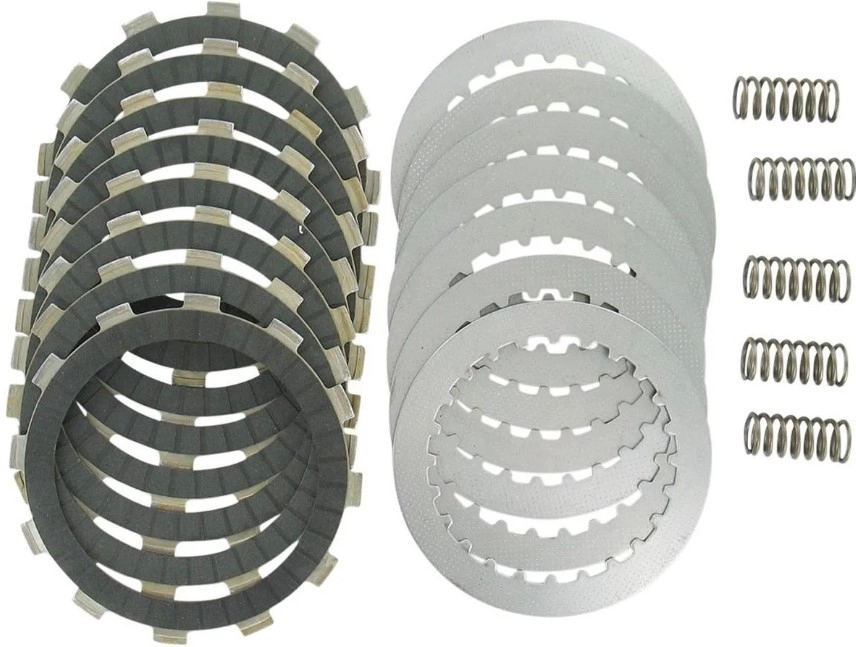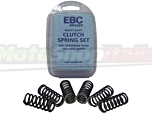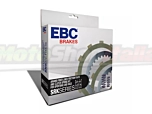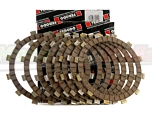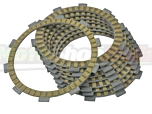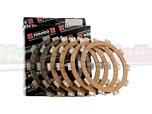The clutch in motorcycles, often underestimated, is vital for a safe and comfortable riding experience. This component acts as a mediator between the engine and the transmission, a crucial role controlling the engine's power. Every time you change gears, the clutch quietly does its job. Think about it: without a functioning clutch, even the most powerful engine would be ineffective. Moreover, it is the clutch that allows you to stop while keeping the engine running. When you release the clutch lever, it reconnects the engine and transmission. This mechanism is essential for both performance and safety of the bike. A poorly functioning clutch can make gear changes difficult and unpredictable. This can become dangerous, especially at high speeds. Thus, the clutch is not just a component; it's the heart of your bike. A vital part that requires regular attention and care. Over time, the clutch discs wear out, reducing the efficiency of the system. Performance and safety are affected. Recognizing the signs of wear is crucial. Hard gear changes, slipping, unusual noises? They are all warning bells. In this article, we explore everything about the clutch. From how it wears out, to warning signs, to maintenance. It's a technical but fascinating topic. Understanding the clutch is essential for every motorcyclist. A well-maintained clutch ensures a smooth and safe ride.
Common Symptoms of a Worn Clutch
When discussing a worn clutch in motorcycles, there are certain signs that should never be ignored. Recognizing these symptoms is crucial for safe road riding. Let's see what these signs are and how they can affect your riding experience.
-
Hard Clutch Lever: One of the first symptoms of a failing clutch is a lever that's harder than usual. If it requires more effort to operate, it's a clear sign. This can occur when the clutch cables wear out or when the clutch discs start to deteriorate.
-
Difficult Gear Changes: If changing gears becomes a task, your clutch likely has a problem. You might notice that the bike doesn't shift gears as smoothly as usual. In some cases, the bike might even skip a gear or struggle to engage it.
-
Noise from the Clutch: Another red flag is the presence of unusual noises from the clutch area. These sounds can range from slight scraping to more pronounced noise when the clutch is engaged.
-
Acrid Smell from the Clutch: A less obvious but important symptom is an acrid smell, similar to burning. This occurs when the clutch discs overheat due to excessive friction.
-
Clutch Slipping: A classic symptom is clutch slipping. It happens when the clutch doesn't fully engage, leading to a loss of power. You might feel it when you accelerate, but the bike doesn't respond as it should.
-
Unusual Vibrations: Sometimes, a worn clutch can cause unusual vibrations. These vibrations can be felt through the clutch lever or the gear pedal.
Keeping an eye on these symptoms is the first step to ensuring that your motorcycle functions well. If you notice one or more of these signs, you should consider replacing the motorcycle clutch or take it to a qualified mechanic for an inspection. Ignoring these symptoms can lead to more serious issues with your bike's safety or performance.
So, remember to listen to your bike and pay attention to the signals it sends. Regular maintenance and prompt response to these symptoms can make the difference between a safe ride and a riskier one.
Factors Affecting the Lifespan of a Motorcycle Clutch
The lifespan of your motorcycle's clutch can vary greatly depending on several factors. Understanding these elements is essential to maximize the lifespan of the clutch and ensure optimal performance. Let's explore the main factors that influence the lifespan of the clutch.
-
Riding Style: How you ride your motorcycle significantly impacts the clutch. Abrupt acceleration, frequent gear changes, and heavy clutch use in city driving can accelerate wear. In contrast, a smoother and more controlled riding style helps preserve the clutch.
-
Riding Conditions: Where and how you ride the bike affects the clutch. Frequent riding in urban areas with heavy traffic requires continuous gear changes, putting a strain on the clutch. Conversely, highway riding, with fewer gear changes, is gentler on the clutch.
-
Type of Motorcycle: The type of bike you have in your garage plays a key role in clutch lifespan. Sports bikes, for example, often require much heavier clutch use compared to touring bikes. The size and design of the engine also affect clutch durability.
-
Clutch Maintenance: Regular maintenance is vital. Periodically checking and adjusting the clutch play, along with replacing the engine oil, contributes to a longer clutch lifespan.
-
Use of the Clutch Lever: The habit of keeping the clutch lever pressed for long, like at traffic lights, can cause premature wear. It's preferable to put the bike in neutral in these situations.
-
Load on the Bike: The load on the bike, including a passenger and luggage, can impact the clutch. Excessive load requires more work from the clutch, especially during starting and uphill.
-
Quality of Components: Using lower quality components can reduce the lifespan of the clutch. Choosing original or high-quality replacement parts is an investment in the longevity of the clutch.
-
Climate and Environment: Extreme weather conditions and dusty environments can accelerate clutch wear. Dust and dirt can infiltrate the components, causing additional friction.
Thus, the lifespan of the clutch is influenced by how and where you ride, the type of bike, maintenance, and the quality of components. Taking care of the clutch not only extends its life but also enhances your riding experience. Keeping these factors in mind, you can ensure that your motorcycle's clutch performs at its best for as long as possible.
When to Replace the Motorcycle Clutch: Guide to Mileage and Maintenance
Determining the right time to replace the motorcycle clutch might seem like a dark art, but there are clear guidelines that can help. A mix of mileage, maintenance, and wear signals gives us precise indications. Let's take a closer look at these aspects.
Indicative Mileage: A general rule is that the clutch can last between 20,000 and 40,000 km. However, this depends greatly on the riding style and type of motorcycle.
-
Riding Style: Aggressive riders, who often rev high and frequently change gears, might need to replace the clutch sooner. A more gentle and gradual use of the clutch can significantly extend its life.
-
Regular Check: Periodically checking the clutch for signs of wear is essential. Remember to examine the thickness of the clutch discs and the integrity of the springs.
-
Preventive Maintenance: Regularly changing the engine oil and using high-quality lubricant can protect the clutch. Clean oil reduces friction and wear.
-
Clutch Lever Response: If the clutch lever becomes too soft or too hard, it might be time for a check. A lever that doesn't respond as it should indicates a potential problem.
-
Clutch Slippage: If the motorcycle loses power or slips during acceleration, it's a sign that the clutch might need to be replaced.
-
Unusual Noises: Squealing or scraping sounds coming from the clutch are a warning bell. These noises can indicate that the components are rubbing abnormally.
-
Lever Vibrations: Unusual vibrations in the clutch lever can be a sign of worn or damaged discs.
To effectively fix the motorcycle clutch, it's crucial to be proactive. Don't wait for the clutch to fail completely. If you start noticing these signs, it's time to consider a replacement.
Guide to Replacing the Motorcycle Clutch
Changing the motorcycle clutch discs might seem daunting or suitable only for experts, but with the right knowledge and spare tools (available at MotoShopItalia), it's a task everyone can handle. Below we've prepared a step-by-step mini-guide to assist you in this process.
-
Preparation: Before starting, gather the necessary tools. You'll need socket wrenches, screwdrivers, pliers, and, of course, the new clutch discs. Many of these tools are available in our store.
-
Accessing the Clutch: Typically, you need to remove the clutch cover, which may require moving other parts like the gear pedal or exhaust pipe, depending on the bike model.
-
Removing the Clutch Cover: Use the socket wrenches to remove the screws of the cover. Be careful not to lose any gaskets or small components.
-
Wear Check: Once opened, inspect the clutch discs for wear. If they are visibly worn or damaged, they need to be replaced.
-
Removing Old Discs: Carefully remove the worn clutch discs. Pliers may be needed to extract them if they are stuck.
-
Installing New Discs: Place the new clutch discs you purchased from MotoShopItalia correctly. Ensure they are aligned properly and slide freely.
-
Reassembling the Cover: Once the new discs are in place, reassemble the clutch cover. Remember to replace the gaskets if necessary to prevent oil leaks.
-
Adjusting the Clutch Lever: After reassembling everything, it's important to adjust the clutch lever to ensure the tension is correct.
-
Final Test: Before getting back on the road, do a test run. You need to be sure the clutch is functioning correctly and that gear changes are smooth and stable.
Costs Associated with Replacing the Motorcycle Clutch
When it comes to replacing the motorcycle clutch, there are two main aspects to consider: the cost of materials and labor. These costs vary based on different factors, such as your bike's model and the choice between an authorized workshop or an independent mechanic. Below is an overview of the costs you might encounter.
-
Material Cost: The clutch discs and any necessary gaskets are the main components to purchase. The price varies depending on the brand and model of the bike. For an average bike, you can expect to spend between 50 and 200 euros for good-quality clutch discs.
-
Labor Cost: The cost of labor depends on the complexity of the job and the workshop. A standard clutch replacement can take between 1 and 3 hours of work. Hourly rates vary greatly, but an average price might range between 40 and 90 euros per hour.
-
Authorized vs. Independent Workshop: Opting for an authorized workshop might cost more, but it guarantees the use of original parts and often includes a warranty on the work. An independent mechanic can offer lower rates and flexibility in parts used.
-
Quote: Before proceeding with the replacement, it's always advisable to request a detailed quote. This will give you a clear idea of the costs you'll need to face.
-
Non-Original Spare Parts: Using non-original spare parts can reduce the cost, but be cautious about quality. Low-quality components might not last long and could compromise the safety of the bike.
-
DIY: If you are handy with mechanics, consider replacing the clutch yourself. You'll save on labor costs, paying only for the materials.
-
Additional Costs: Remember that during the clutch replacement, the mechanic you choose might notice other issues that need attention, increasing the total repair cost.
-
Longevity and Performance: We know that investing in quality components and expert labor might cost more initially, but it often translates into greater longevity and better performance, saving you money in the long term.
Therefore, replacing the clutch is an investment in your motorcycle. Choosing quality components and reliable service not only ensures a safe and enjoyable ride but can also save money in the long term by avoiding frequent repairs and premature wear.
Conclusion
Taking care of the motorcycle clutch is essential. Proper attention ensures optimal performance and safety. Smooth and careful riding helps. Avoiding abrupt starts protects the clutch. Regular maintenance is also crucial. Check the tension and alignment of the clutch regularly. Changing the engine oil as recommended is important. When it comes to spare parts, quality matters. Using high-quality parts extends the life of the clutch. MotoShopItalia offers clutches from renowned brands like Ferodo, EBC, and FCC. These brands are known for the reliability and quality of their clutches. Suitable for both motorcycles and scooters, these clutches ensure excellent performance. If in doubt about maintenance, consult a professional. An experienced mechanic can provide valuable advice.

 Italiano
Italiano
